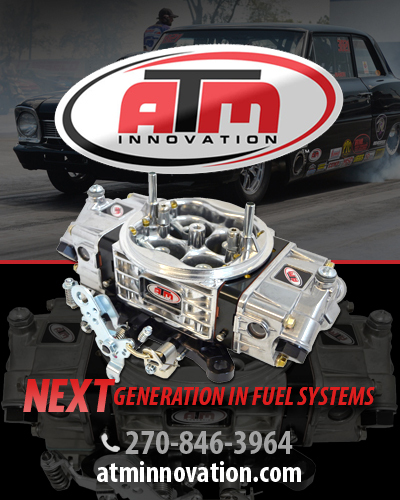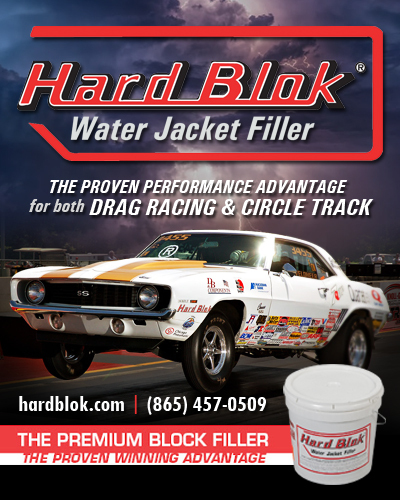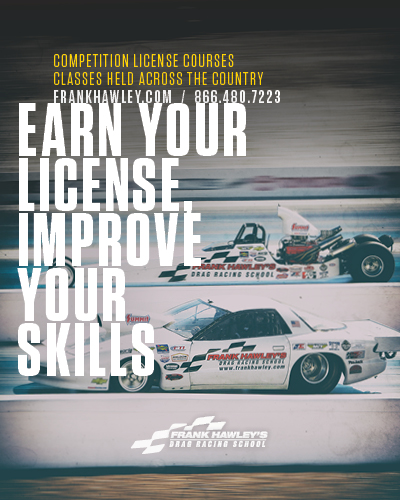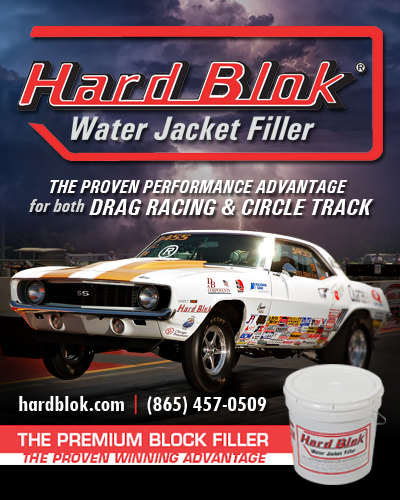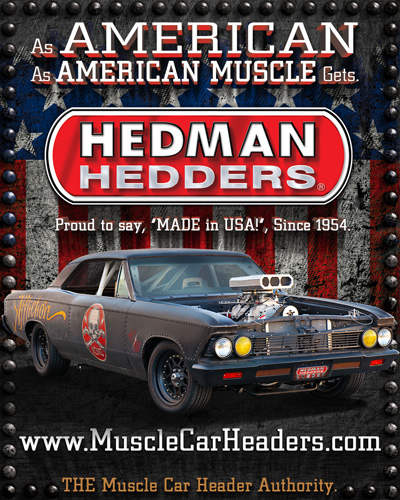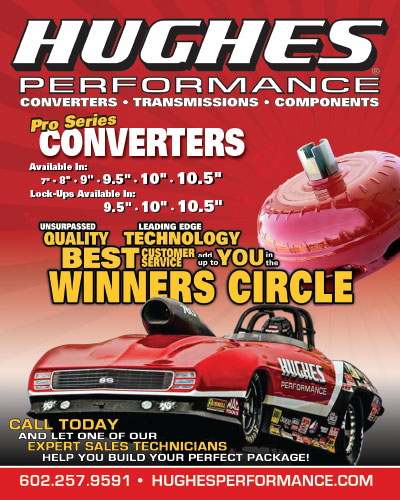LIFE’S OBSTACLES PROVE NOTHING SLOWS BECKMAN
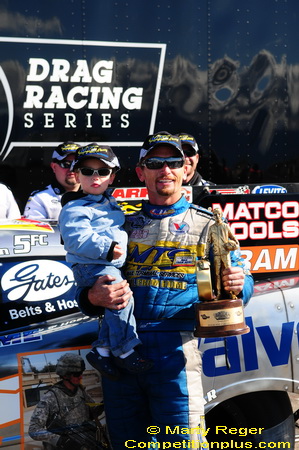 While life placed several bumps in his path, Jack Beckman’s determination and outgoing personality allowed him to rocket through the obstacles faster than his nitro-burning Funny Car tears up the track.
While life placed several bumps in his path, Jack Beckman’s determination and outgoing personality allowed him to rocket through the obstacles faster than his nitro-burning Funny Car tears up the track.Beckman’s love of racing began when his uncle took Jack and his brother to Orange County International Raceway in California.
“When I was seven and my brother Ted was eight, our uncle John took us to Orange County for my first drag race,” explained Beckman. “I was hooked…I thought it was the most amazing thing I had ever seen. My father got my brother and I involved. I bought my ’68 El Camino when I was 15 from my dad.”
While life placed several bumps in his path, Jack Beckman’s determination and outgoing personality allowed him to rocket through the obstacles faster  than his nitro-burning Funny Car tears up the track.
than his nitro-burning Funny Car tears up the track.
Beckman’s love of racing began when his uncle took Jack and his brother to Orange County International Raceway in California.
“When I was seven and my brother Ted was eight, our uncle John took us to Orange County for my first drag race,” explained Beckman. “I was hooked…I thought it was the most amazing thing I had ever seen. My father got my brother and I involved. I bought my ’68 El Camino when I was 15 from my dad.”
“I hot-rodded that thing a little,” the San Fernando, Calif. native said proudly, “and it was the first car I took down the dragstrip in 1986 when I was stationed in New Mexico in the Air Force. From there, I bought an old dragster. I kept plugging away, racing every chance I could get.”
After racing on weekends, Beckman returned to work on Monday morning as an elevator repairman. The money was good and he financed his racing from overtime pay.
In 1997, he went to Frank Hawley’s NHRA Drag Racing School to earn his Top Alcohol Dragster license. Once again his determination helped him through the experience.
“I had to go back six times to get my license,” he said with a laugh. “There were mechanical problems a couple of times, it was too cold one time, it rained a couple of times and I struggled driving one time. Consequently, I spent a lot of time with Frank.”
During one session, Beckman began to converse with a fellow classmate about a run. The conversation had such an impact that the veteran Hawley offered his student a job working at the school.
“I had been there several times and seen and made a lot of mistakes,” he said. “Now, one of the guys was really hard of hearing. He’s standing next to me, and I’m explaining something, but he can’t hear me, so I had to talk real loud. Frank pulled me over to the side, and I thought, ‘I’m going to get yelled at and he’s going to tell me to shut up it’s his class.’ He said, ‘Ever thought about doing anything different?’
"I thought this might give me a chance to network. I was an elevator man for 11 years, and there aren’t a lot of car owners you meet walking up stairs to repair an elevator. I thought this probably will help out a bunch, so I quit my career.”
With his new job as an instructor at Frank Hawley’s school and a Top Alcohol Dragster license, Beckman began to drive several cars for different team owners. In 2003, the biggest moment came when he clinched the Super Comp World Championship in his own car, “the Blackbird.”
He secured the championship when he defeated a former student by .005 in front of family and friends in the fourth round at the 2003 NHRA Finals. While he calls it the “round I’ll never forget,” it soon would take a back seat to the race he was about to run.
“I started feeling bad in September 2003,” he said, “but not all the time. It felt like I had a cold off and on, but the doctors didn’t find anything until May 2004. By the time they found the cancer, it had spread pretty far and pretty fast. They said, ‘We have to hit this hard. The chemo will either cure you or kill you. The cancer won’t kill you. If your body responds, the cancer will die. Otherwise, the chemo will kill you.”
Beckman was diagnosed with high grade level 3B lymphoma. Through six months of intensive chemotherapy, he only missed two “school” days at Hawley’s school and only missed competing in two races. His lifelong passion for racing served as motivation to continue fighting.
“When you’re faced with a life-threatening situation, there is a real temptation to go out and do everything you’ve always wanted to do in your lifetime. That didn’t work for me, because all I’ve ever wanted to do is race and teach others how to race and I was already doing that.”
After his eighth and final chemo treatment in October 2004, the cancer was in remission. What did he do to celebrate? In his words, “The cure for cancer: G-force therapy.”
With the help of Rodger and Karen Comstock, fellow sportsman racers and owners of Mail Terminal Services, the ever-determined Beckman found himself strapped into the cockpit of Dexter Tuttle’s Top Fuel machine in April 2005.
“It was surreal getting in that Top Fuel car,” he said excitedly. “My first race, I’m the second pair out. I was standing there during the National Anthem and thinking, ‘I’m going to hop in a Top Fuel car.’ Every other race for the last 20 years, I was the one running up to the grandstand to watch the first pair. I was so caught up in the moment; I was late getting in the car.”
Beckman burst on to the Funny Car scene at the end of the 2006. He competed in the final five events of the season, earned his first win, finished runner-up once, qualified number one and reset the national records for speed and elapsed time at the NHRA Finals. His Funny Car speed record, 333.66 mph, still stands and validated his nickname, “Fast Jack.”
During NHRA event weekends, fans regularly form a long line outside Beckman’s Mail Terminal Services/Valvoline pit as people wait to get an autograph from the welcoming competitor. He is thankful for the support and explains why it is nice.
“It is vindication when people realize you are a good person,” he acknowledged. “It is easy on the outside to say that guy has his act together, but I’m like anyone else, I have my problems. I don’t think I’m a special person. I think I’m a person who has had some special things happen to him. I try to be honest, I try to be friendly to everybody, and maybe there is a payoff for that. Maybe that warmth and friendliness has paid back. I didn’t do it for that reason; it’s just the way I am.”
When asked how he wanted to be remembered after his career is finished, Beckman’s compassionate side came through.
“I would like to be remembered as a steady driver,” he started. “I may not be the best leaver or peddler out there, but I’d like to be remembered as a solid driver. I think on an even more important scale, I want to be remembered as someone that went out of their way for the sick kids and people with cancer. I want to be remembered as someone who was seen as dignified even when the situation was difficult. I want to be remembered as someone with character, who was good behind the wheel and to the fans. How about, ‘Good both on and off the track?’”
“Above all, I want my son, for all the right reasons, to be incredibly proud of his dad. Because if it is for all the right reasons, I’ve done everything I needed to do.”
That is one obstacle Beckman will not have to worry about.























